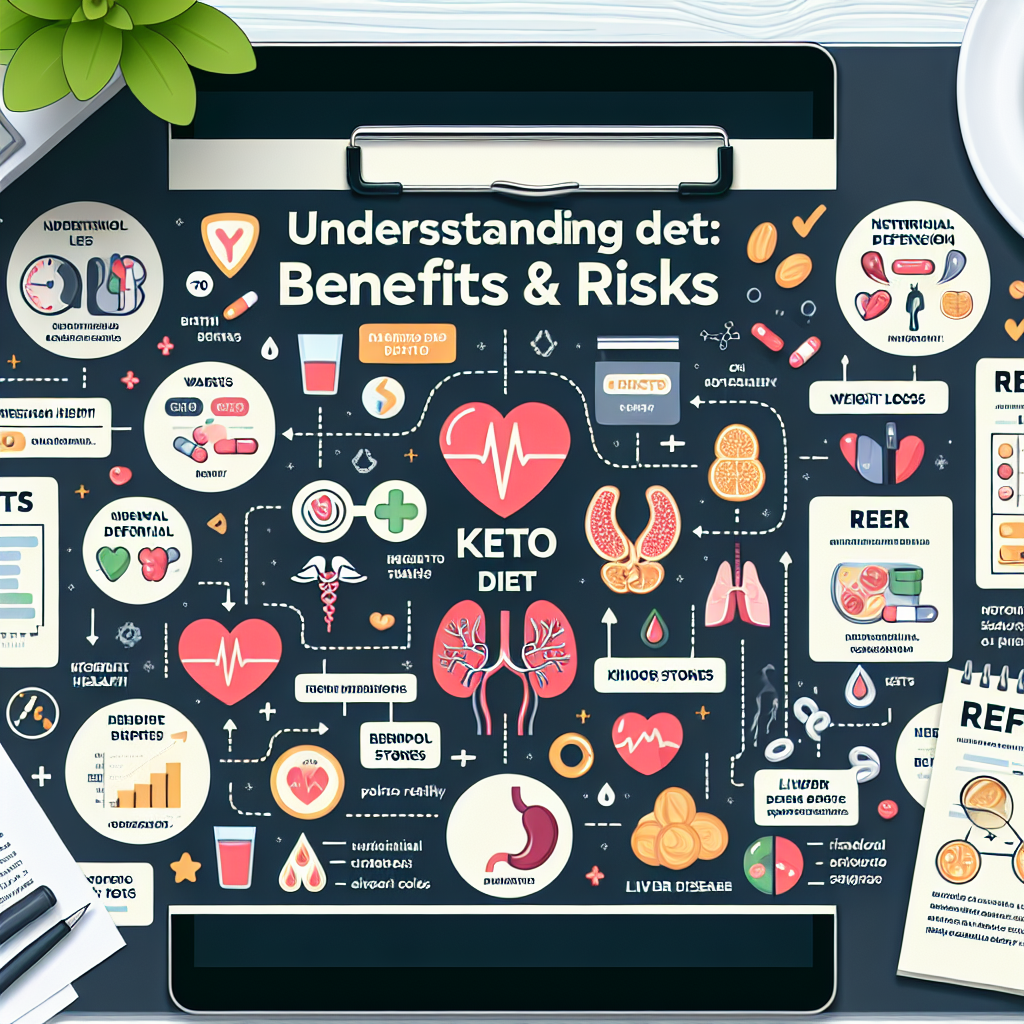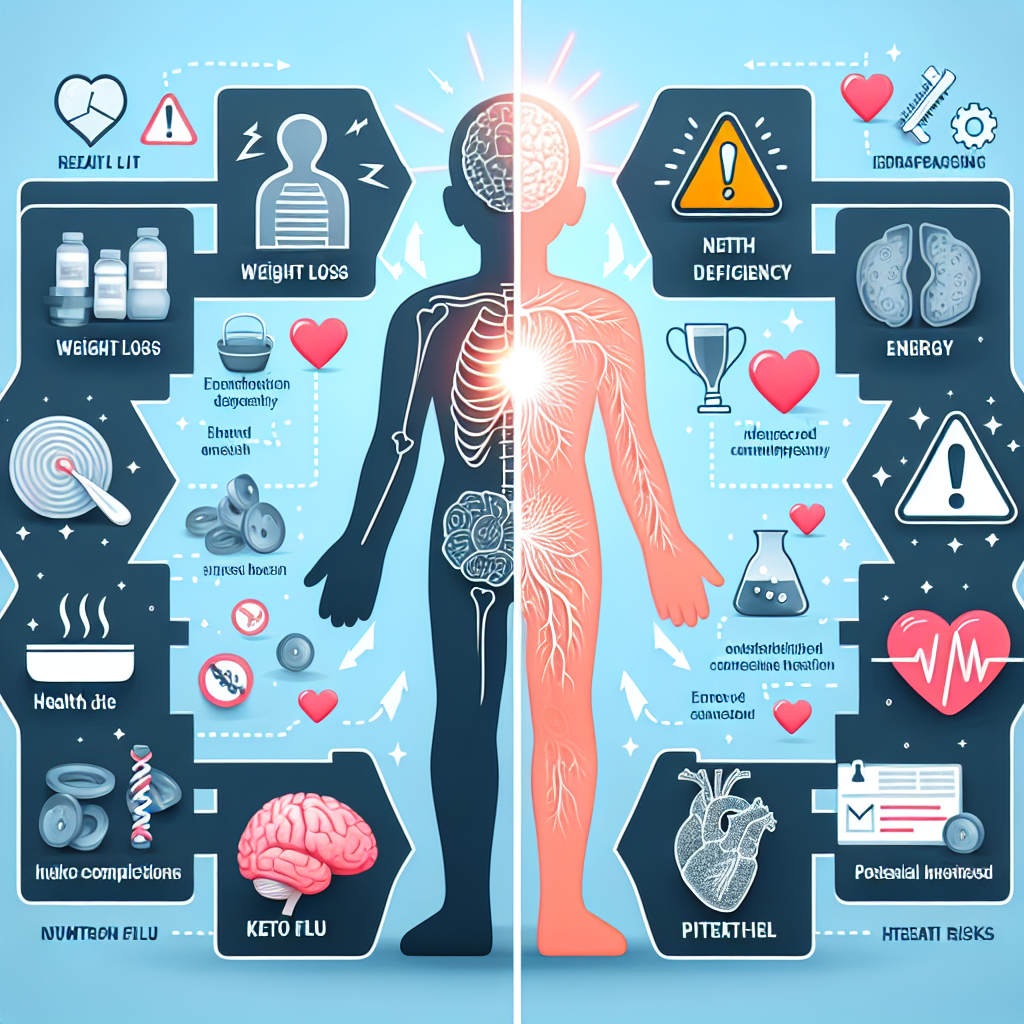Understanding the Keto Diet: Benefits and Risks

Discover the benefits and risks of the Keto Diet today! Gain a comprehensive understanding of this popular diet and make an informed decision about your health. Visit My Vibrant Vitality now.
Exploring the Keto Diet: Unveiling its Health Benefits and Potential Risks
The ketogenic diet, commonly known as the keto diet, has gained significant popularity in recent years. This high-fat, low-carb diet is often touted as a miracle weight loss solution, but it’s essential to understand its potential benefits and risks before embarking on this dietary journey.
The keto diet primarily involves drastically reducing carbohydrate intake and replacing it with fat. This reduction in carbs puts your body into a metabolic state called ketosis, where fat, from your diet and your body, is burned for energy. It’s this shift in metabolism that has made the keto diet a go-to choice for many individuals seeking weight loss.
One of the most significant benefits of the keto diet is its potential for rapid weight loss. By forcing the body to burn fat for fuel, it can lead to a decrease in body fat percentage. This can be particularly beneficial for individuals struggling with obesity or those looking to shed excess weight. Moreover, the high-fat content of the diet can help to curb cravings and reduce overall calorie intake.
Beyond weight loss, the keto diet may also offer potential benefits for certain health conditions. Some research suggests that a ketogenic diet may be beneficial in managing type 2 diabetes by improving insulin sensitivity and reducing blood sugar levels. Additionally, it’s been suggested that the diet may have neuroprotective effects and could potentially benefit individuals with neurodegenerative disorders like Alzheimer’s and Parkinson’s disease.
However, like any diet, the keto diet is not without its potential risks and side effects. One of the most common side effects is the ‘keto flu,’ a group of symptoms including headache, fatigue, and nausea that some people experience when first starting the diet. These symptoms are typically temporary and subside as the body adjusts to its new fuel source.
More serious potential risks of the keto diet include nutrient deficiencies and an increased risk of heart disease. Because the diet restricts many healthy foods, such as fruits, vegetables, and whole grains, it can be challenging to get all the necessary nutrients your body needs to function optimally. Furthermore, the high intake of saturated fats on the keto diet can potentially lead to an increase in LDL (bad) cholesterol levels, which is a risk factor for heart disease.
It’s also worth noting that while the keto diet can lead to quick weight loss, maintaining this weight loss can be challenging. Many people find it difficult to adhere to the diet’s strict macronutrient ratios in the long term, leading to weight regain once they return to their regular eating habits.
In conclusion, while the keto diet offers potential benefits, including rapid weight loss and potential improvements in certain health conditions, it also carries potential risks. These include nutrient deficiencies, an increased risk of heart disease, and difficulty maintaining weight loss. As with any diet, it’s crucial to consider these factors and consult with a healthcare professional before starting the keto diet. This will ensure that the diet is suitable for your individual health needs and that you can implement it in a safe and sustainable way.
The Keto Diet Decoded: A Comprehensive Guide to its Advantages and Disadvantages

The ketogenic diet, commonly known as the keto diet, has gained significant popularity in recent years. This high-fat, low-carb diet has been lauded for its potential weight loss and health benefits. However, like any diet, it also carries certain risks. Understanding the keto diet in its entirety, including its advantages and disadvantages, is crucial before embarking on this dietary journey.
The keto diet is based on the principle of ketosis, a metabolic state where the body, deprived of its usual fuel source—glucose—starts burning fat for energy. This is achieved by drastically reducing carbohydrate intake and replacing it with fat. The reduction in carbs puts your body into a metabolic state called ketosis. When this happens, your body becomes incredibly efficient at burning fat for energy. It also turns fat into ketones in the liver, which can supply energy for the brain.
One of the most significant benefits of the keto diet is weight loss. Numerous studies have shown that people on a high-fat, low-carb diet burn fat at a faster rate than those on a high-carb, low-fat diet. This is primarily because a lower intake of carbohydrates reduces the levels of insulin in your body, which in turn leads to fat burning and the production of ketones.
Another advantage of the keto diet is its potential to improve certain health conditions. Research suggests that the diet may have benefits for a variety of health conditions, including heart disease, cancer, Alzheimer’s disease, epilepsy, Parkinson’s disease, and polycystic ovary syndrome. However, more research is needed to fully understand the effects of the keto diet on these conditions.
Despite its potential benefits, the keto diet also carries certain risks. One of the most common side effects is the ‘keto flu,’ a group of symptoms that can appear in the first few days of the diet. These symptoms, which can include headache, fatigue, and nausea, are typically temporary and subside after the body adjusts to its new fuel source.
Another risk associated with the keto diet is nutrient deficiency. Because the diet restricts certain food groups, it can be challenging to get all the nutrients your body needs to stay healthy. This can lead to deficiencies in essential vitamins and minerals, which can have long-term health effects if not addressed.
Furthermore, the keto diet may not be suitable for everyone. People with certain conditions, such as liver disease, pancreatitis, and disorders of fat metabolism, should avoid the diet. Additionally, people with type 1 diabetes should only follow the diet under medical supervision, as it can increase the risk of ketoacidosis, a dangerous condition that can lead to diabetic coma or even death.
In conclusion, while the keto diet offers potential benefits such as weight loss and improved health conditions, it also carries certain risks. It’s essential to consult with a healthcare professional before starting the diet to ensure it’s suitable for you and to receive guidance on how to follow it safely and effectively. Remember, the key to a healthy diet is balance and variety, and the keto diet should be considered a tool, not a cure-all.
The Keto Diet: A Balanced Perspective on its Rewards and Risks
The ketogenic diet, commonly known as the keto diet, has gained significant popularity in recent years. This high-fat, low-carb diet has been lauded for its potential weight loss and health benefits. However, like any diet, it also carries certain risks. To make an informed decision about whether the keto diet is right for you, it’s essential to understand both its rewards and risks.
The keto diet is based on the principle of ketosis, a metabolic state in which the body burns fat for energy instead of carbohydrates. When you consume fewer carbs, your body is forced to use its stored fat for fuel, which can lead to weight loss. This is one of the primary reasons why many people turn to the keto diet.
In addition to weight loss, the keto diet has been associated with several other health benefits. For instance, research suggests that it may help control blood sugar levels, making it a potential dietary approach for those with type 2 diabetes. Furthermore, some studies indicate that the keto diet could improve heart health by reducing cholesterol levels. It’s also been suggested that the diet may have neuroprotective effects and could potentially help in managing conditions like Alzheimer’s and Parkinson’s disease.
However, it’s important to note that while these potential benefits are promising, more extensive and long-term studies are needed to fully understand the impact of the keto diet on these health conditions.
On the flip side, the keto diet also carries certain risks and potential side effects. One of the most common is the “keto flu,” a group of symptoms including headache, fatigue, and nausea that some people experience when they first start the diet. These symptoms are typically temporary and can be mitigated by staying hydrated and ensuring adequate electrolyte intake.
More serious risks associated with the keto diet include nutrient deficiencies and an increased risk of heart disease. Because the diet restricts certain food groups, it can be challenging to get all the necessary nutrients. For example, the diet is typically low in fruits, vegetables, and whole grains, which are all rich sources of fiber, vitamins, and minerals.
Moreover, the high intake of saturated fats on the keto diet could potentially increase your risk of heart disease. While the diet can lower bad cholesterol levels, it can also raise levels of good cholesterol, which can be harmful in excess.
Lastly, the keto diet may not be suitable for everyone. People with certain health conditions, such as liver disease, pancreatitis, and disorders of fat metabolism, should avoid the diet. Additionally, pregnant and breastfeeding women, as well as individuals with type 1 diabetes, should consult with a healthcare professional before starting the keto diet.
In conclusion, the keto diet offers potential benefits, including weight loss and improved blood sugar control. However, it also carries risks, such as nutrient deficiencies and potential heart disease. As with any diet, it’s crucial to consider your individual health needs and consult with a healthcare professional before making significant dietary changes. The keto diet, like any diet, should be viewed as one potential tool for health and wellness, not a one-size-fits-all solution.